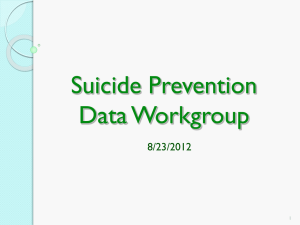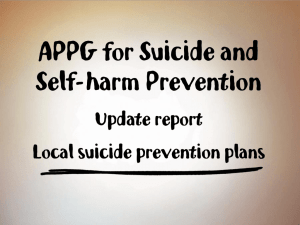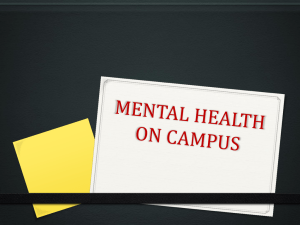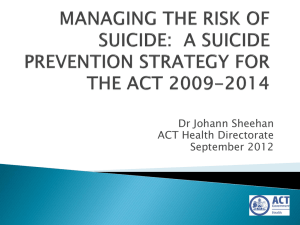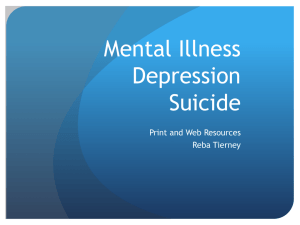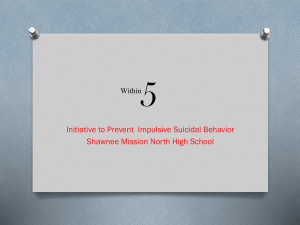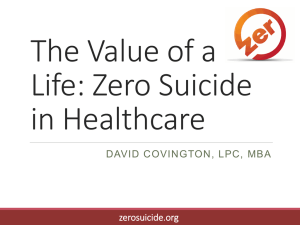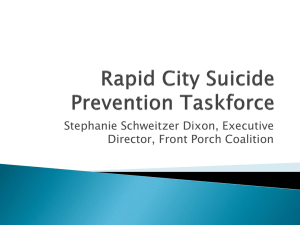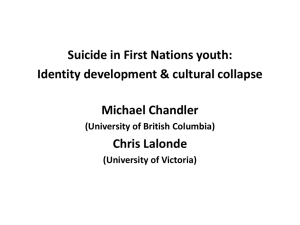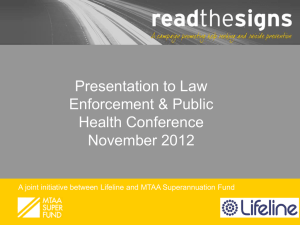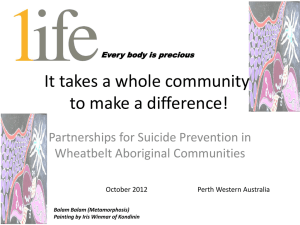here - Baylor University
advertisement
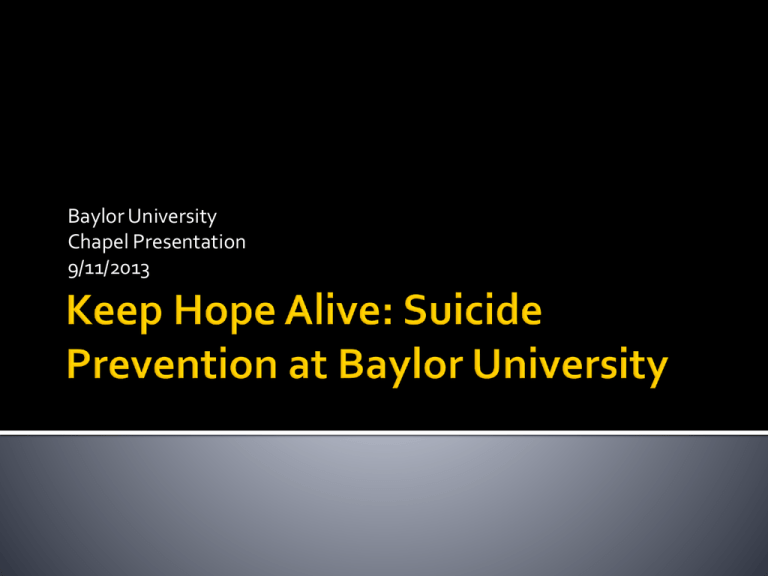
Baylor University Chapel Presentation 9/11/2013 Statistics on Suicide Myths about Suicide Warning Signs Depression Three steps to helping a friend who is having thoughts of suicide More people die from suicide than homicide in the U.S. Approximately 10 people will die from suicide in the U.S. before Chapel is finished this morning. Center for Disease Control (2011)– more than 34,000 documented suicides Estimate 25 attempts for every completed suicide = 850,000 attempts Please raise your hand if: You have ever known someone who has seriously considered suicide, attempted suicide, or committed suicide Please keep your hand raised if: You have ever known someone who attempted or completed an act of suicide 5.5% of students have seriously considered suicide in the past 12 months. 1.3% have attempted suicide in the past 12 months. 40% of college students know someone who has attempted suicide. 28% of college students know someone who has died from suicide Second leading cause of death for college students 17.5% of Baylor students have seriously considered suicide at some point in their life. 4.2% of Baylor students have seriously considered suicide in the past 12 months. 2.1% of Baylor students have attempted suicide in the past 12 months. Since 2006 – averaged between 1-2 suicides per year Myth: Confronting a person about suicide will only make them angry and increase the risk of suicide. Fact: Asking someone directly about suicide lowers anxiety, opens up communication, and lowers the risk of an impulsive act. Myth: No one can stop a suicide, it is inevitable. Fact: If people in a crisis get the help they need they will probably never be suicidal again. Myth: Once a person decides to complete suicide there is nothing you can do to stop them. Fact: Suicide is the most preventable kind of death and almost any positive action may save a life. Myth: Those who talk about suicide don’t do it. Fact: People who talk about suicide may try, or even complete, an act of suicide. Myth: Suicidal people keep their plans to themselves. Fact: Most suicidal people communicate their intent sometime during the week preceding their attempt. (This shows the ambivalence most suicidal people have about wanting to die.) Myth: Talking or asking about suicide will put the idea in someone’s head. Fact: This just doesn’t happen! Asking directly about suicide lowers anxiety, opens up communication, and lowers the risk of an impulsive act. Direct Statements “I’ve decided to kill myself.” “I wish I were dead.” “I’m going to end it all.” “If X doesn’t happen, I’m going to kill myself.” Indirect Statements “I’m tired of life. I can’t go on.” “Who cares if I’m dead anyway.” “My family would be better off without me.” “I don’t want to be here anymore.” Previous suicide attempt Buying a gun or stockpiling pills Increased use of alcohol or drugs Giving away prized possessions Putting personal affairs in order Hopelessness Withdrawing from friends/social activities Reckless and impulsive behavior Loss of a major relationship Failing a class Being suspended or expelled from school Fear of becoming a burden to others Denied acceptance to a school or program Death of a spouse, child, friend, or parent especially if by suicide Up to 25% of all Americans experience an episode of clinical depression during their lifetimes. Untreated depression is the #1 cause of suicide. About 2/3 of people who commit suicide are depressed at the time of their death. Depression is a treatable condition. • Difficulty Sleeping • Loss of Appetite Self-esteem Social Isolation Concentration Energy &Motivation Alcohol/substances Irritability Worrying & brooding Tearfulness • Less enjoyment of previously pleasurable activities • A hopeless, pessimistic outlook • Feeling sad, guilty, or worthless • Thoughts of death, suicide, or self-harm Less Direct Have you been feeling so depressed that you just want to get out of here? Do you ever wish you could go to sleep and never wake up? Direct You look pretty depressed. I wonder if you are thinking about killing yourself? Are you thinking about committing suicide? You aren’t suicidal are you? You aren’t thinking about doing anything stupid or crazy are you? You aren’t thinking about killing yourself are you? Remember… Suicide is not the problem; it is the only solution to a perceived unsolvable problem. Listen and give your full attention. Offer hope in any form: “We’ll get through this.” “I’m on your side.” Express your concern for the person: “I’m worried about you.” “I want you to live.” Then Ask: “Will you go with me to get some help?” The Best Referral: Take the person directly to someone who can help. The Second Best Referral: Get a commitment from the person to stay safe and accept help, then make arrangements for that help. Baylor University Counseling Center Call 710.2467 or go to the 2nd floor of the McLane Student Life Center After 5 pm & Weekends – call 710.2467 and follow the directions for reaching our crisis line. Office of Spiritual Life Call 710-3517 or go to the Bobo Spiritual Life Center Tell Someone: professor, community leader, residence hall director, residence chaplain, Success Center staff, Baylor Police Department, etc. Immediate danger means the person… has already injured himself/herself has taken an overdose has a weapon and is threatening to use it is on top of a bridge, open stairway, or building CALL 911 IMMEDIATELY! Do NOT call the Counseling Center first! Every second counts in these situations! Since almost all efforts to persuade someone to LIVE instead of attempt suicide will be met with agreement and relief, don’t hesitate to get involved or take the lead.
